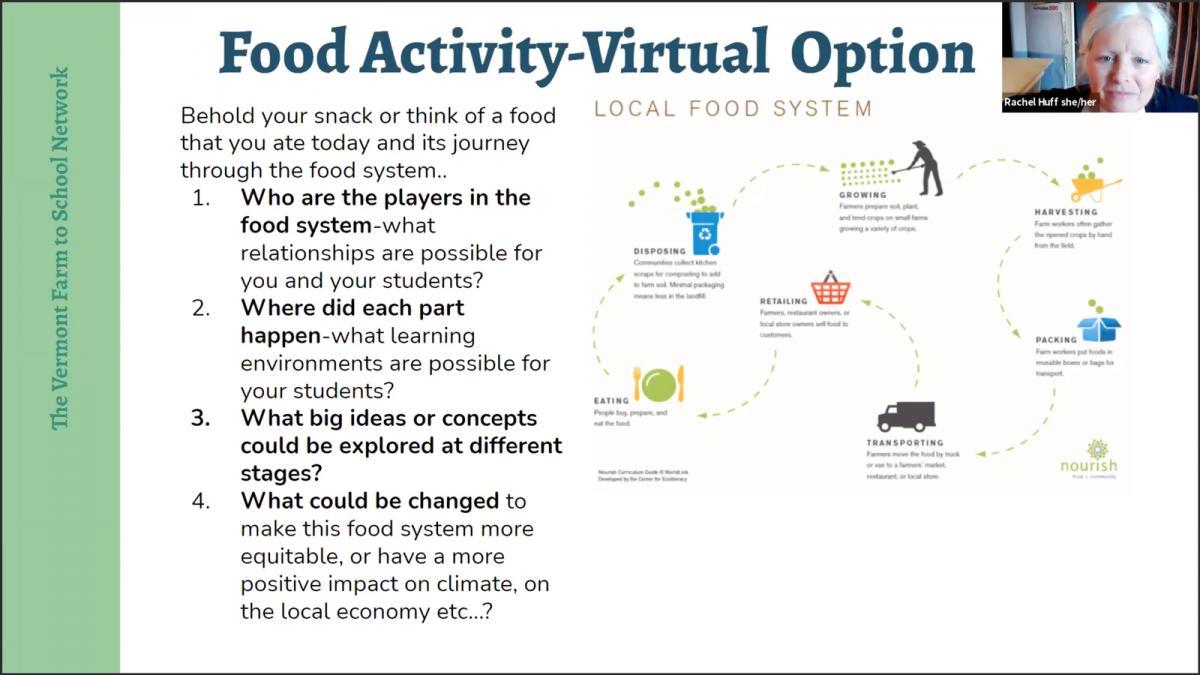Expanding & Unifying Farm to School Professional Learning across Vermont
Posted on July 29, 2022
“We were working to unify Vermont’s professional learning, but the work really unified us. We looked internally and connected, which was critical in keeping us going during a difficult time.” –Rachel Huff, Farm to School Coordinator at Healthy Roots
When you close your eyes and think of the word “network”, what do you see? People will often answer, “a web!” — a sprawling lattice of nodes that takes up space, aligns, and expands. But what that visualization can often overlook are the strings, the connections between nodes and the internal relationships they represent. It is these relationships and co-learning within a Network that can facilitate its most important work. This was evident in the Vermont Farm to School & Early Childhood Network’s modular webinars, initiated in 2020 with funding through the Vermont Agency of Education.
Network partners set out to create a series of professional learning workshops for educators to bring farm to school to more students and their families. These partners would then provide follow-up support during the school year using Peer Learning Communities (PLCs), direct technical assistance, and collaborative learning experiences.
What began as a plan for in-person offerings quickly shifted to the virtual setting when the pandemic closed school buildings and required distance learning. The team was quick to reimagine the project into a series of virtual workshops with an archived collection of recordings under five overarching themes: School Food 101, Nuts and Bolts of Farm to School, Student Engagement and Youth Voice, Farm to School and Trauma Informed Practices, and Food Justice. The group made sure the hands-on learning experience wasn’t completely lost by creating interactive online components to each webinar.

A screenshot from the Student Engagement & Youth Voice: Vermont Farm to School Network webinar recording.
“Educators have such little time,” says Rachel Huff, Farm to School Coordinator at Healthy Roots, as she thinks back on the process. “It can be so tempting to stick to presenting the critical information they need and leave out the interaction. But going to a breakout room for a short activity is much more effective in modeling what we’re trying to do here: support educators in helping kids to slow down, appreciate food, and engage with the food system.”
One memorable activity: Presenters gave participants a few minutes to move around, grab a food item out of their fridge, and come back to a virtual breakout room to chat about what they found (see above). “These smaller groups create space for new voices and new leaders,” shares Rachel. “Suddenly, new voices are in the mix and we’re hearing from everyone in the webinar! It’s essential to model that process for teachers because it’s what we’re asking them to do with their students — bring in more voices and make learning an interactive, food-based experience.“
By doing this work in collaboration across the state, partners were able to tap into each other's best practices and knowledge, and more easily problem solve during the transition from in-person to virtual. The result: a shared set of consistent professional learning tools everyone could use and offer to schools across the state.
“We really had a collaborative, generative conversation from the start about what we felt we were perfectly suited to offer together,” shares Jen Cirillo, Director of Professional Learning at Shelburne Farms Institute for Sustainable Schools. ”We all have something to contribute, but maybe we don’t each have all of the pieces in our separate organizations to cover every topic. But, across the Network, we could cover everything and support each other’s learning so we all felt confident teaching about these ideas in our regions.”
“Creating the webinar materials and recordings was maybe more important than the final product,” adds Rachel. “We were working to unify Vermont’s professional learning, but the work really unified us. We looked internally and connected, which was critical in keeping us going during a difficult time.”
What’s next for this project? The team is updating content, to be more inclusive, equitable, and accessible to all learners. New topics are surfacing, too, such as connecting climate action and farm to school. Schools can request a professional learning module by contacting the Network at [email protected].
“Everyone put their best work out at the time, and I think everyone feels a sense of collective ownership over the modules,” shares Jen. “Now we’re going back and making updates together so we all have access to the best possible practices. The work reflects all of us as a Network and all the learning we’ve done over these last two years.”
Project partners include Vermont FEED, Shelburne Farms, Healthy Roots Collaborative, Food Connects, Green Mountain Farm to School, and Vital Communities.
Find the full series of webinars here.
Banner image photo by john lozano on Unsplash.